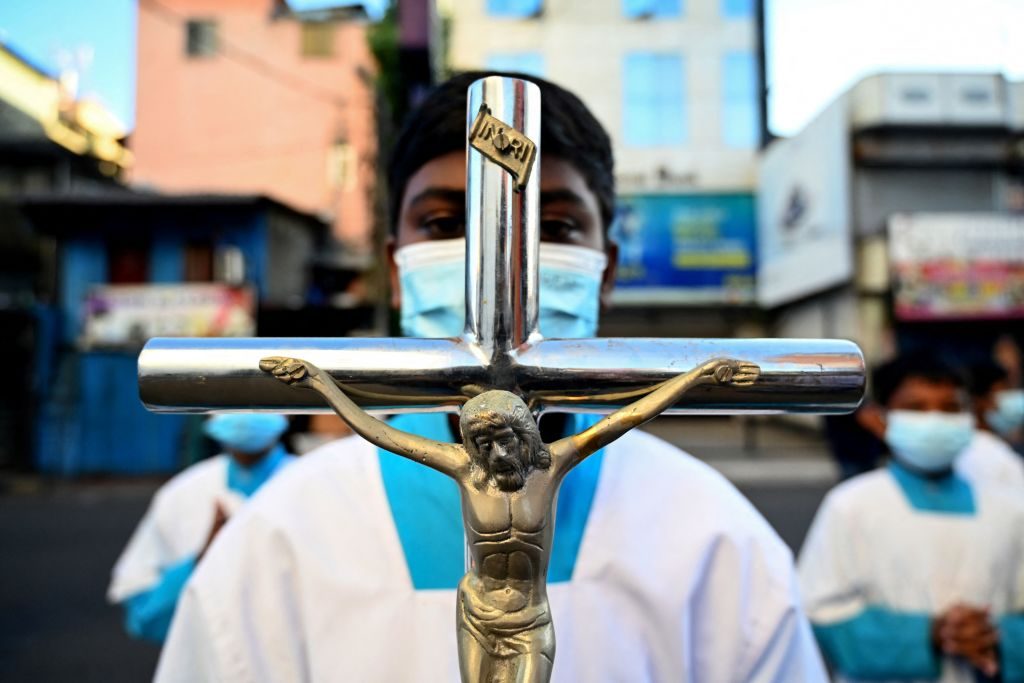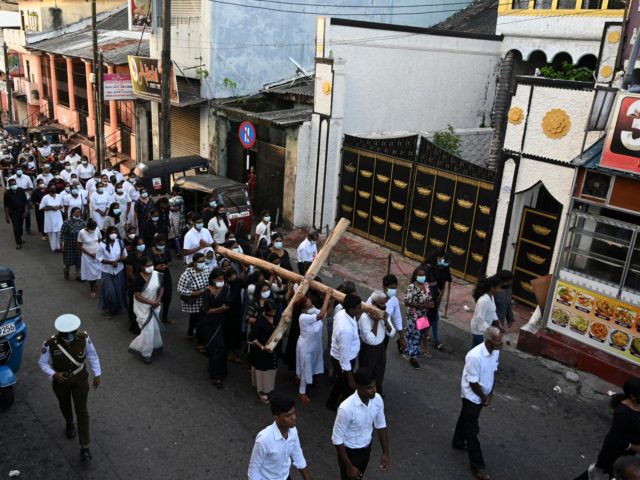Stage and television actor Jehan Appuhami announced on Monday he would bear a cross for a three-day trek to the presidential offices in Sri Lanka demanding justice for the victims of the 2019 Easter bombings that killed nearly 300 Christians.
Appuhami is carrying a life-sized cross from Katuwapitiya to Galle Face, the Colombo neighborhood where President Gotabaya Rajapaksa is headquartered, a journey of about 25 miles that will land him at the heart of an ongoing, weeks-long protest demanding Rajapaksa and everyone in his administration resign for failing to properly run the country.
“Yes, that would be me,” Appuhami posted on Facebook on Tuesday, sharing a photo of himself dressed as Jesus. He announced he would leave for Galle Face to demand the government “reveal the truth about the brutal Easter attack”.
The Sri Lankan Daily Mirror newspaper published images on Tuesday of Appuhami carrying his cross out of Katuwapitiya.
Appuhami has reportedly scheduled himself to arrive on Thursday at the Kochchikade church, one of the six targets of the jihadists attacks, and then walk towards Galle Face to meet the protesters. Images online showed him carrying his cross alongside supportive protesters carrying signs demanding justice for those killed.
Sri Lanka is currently facing the worst economic crisis in its history. The south Asian country has largely run out of food, medicine, fuel, and other basic necessities, resulting in hospitals delaying surgeries, massive (and deadly) lines at gas stations, and the government defaulting on all its loans to use the money to buy food instead. Sri Lanka is a “democratic socialist” nation, so the private sector’s ability to address supply concerns is largely limited. Multiple administrations of Rajapaksas and allied politicians have greatly diminished Sri Lanka’s economic independence additionally by joining the Belt and Road Initiative (BRI), an international Chinese Communist Party program that offers poor countries predatory loans that result in loss of sovereignty.
Sri Lankans have been organizing protests – including an encampment in front of Rajapaksa’s presidential secretariat now known as “Occupy Galle Face” – for the past two months demanding Rajapaksa resign. Protesters are also demanding the ouster of Prime Minister Mahinda Rajapaksa and every other member of the Rajapaksa oligarchy in power, which at its peak boasted up to 40 family members in public offices.
In this context, Sri Lanka will observe the third anniversary of the 2019 Islamic State bombings of churches and hotels on April 21. As the attacks occurred on the holiday, however, rather than observing the date, Sri Lankan Christians marked the anniversary on Easter Sunday.
Members of a group later identified as National Thowheed Jamath, which had pledged allegiance to the Islamic State, sent suicide bombers into three crowded churches and hotels serving Easter brunch meals – attracting Christians – on Easter morning of that year. Authorities documented 269 people killed, many of them young children, and eyewitnesses described suicide bombers detonating towards the backs of churches, where parents of infants tend to linger to ensure a quick exit if their baby becomes fussy.
Sri Lanka is a majority Buddhist country with significant Christian, Muslim, and Hindu minorities. Buddhists responded to the bombing targeting Christians with mob attacks on mosques and the homes and businesses of people known or believed to be Muslims. One Buddhist monk recommended stoning known Muslims to death.

Christian devotees take part in the annual Way of the Cross ritual, which symbolises the final journey of Jesus Christ before he was crucified, during a Good Friday service in Colombo on April 15, 2022. (ISHARA S. KODIKARA/AFP via Getty Images)
In the aftermath of the attacks, a Sri Lankan intelligence investigation found that then-Defense Minister Hemasiri Fernando had received a note from Indian government officials warning that Islamic State elements were planning an attack within Sri Lanka, but neither he nor anyone in the administration of then-President Maithripala Sirisena acted to prevent the attack. While national disgust with the terrorist acts did lead to the Rajapaksas returning to power fully (Sirisena had tried to force Mahinda Rajapaksa into the prime minister position, triggering a constitutional crisis), those in charge of the government at the time endured few consequences for the bombings happening on their watch.
Dissatisfaction with the national government, while already present under Sirisena, has exploded under Gotabaya Rajapaksa. The “Occupy Galle Face” protest is now 11 days old and shows no sign of leaving, demanding the removal of all federal government officials and all Rajapaksas. Reports from the scene describe a “carnival-like atmosphere” where people are camping in tents, making food together, and flying kites.
The Galle Face protests have remained relatively peaceful, but others around the country have resulted in government violence. On Tuesday night, police killed at least one person and injured another 24 by opening fire at a crowd of protesters in Rambukkana, an inland town, in an attempt to get them to leave.
“Police Spokesperson SSP Nihal Thalduwa said police issued warnings to the protestors to leave the area, however they did not comply,” the Sri Lankan outlet News 1st reported, claiming the protesters were attempting to destroy a railway crossing.
Follow Frances Martel on Facebook and Twitter.

COMMENTS
Please let us know if you're having issues with commenting.